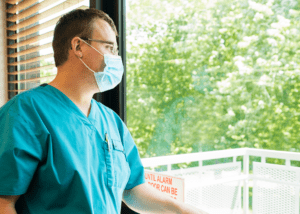Forensic Nurses are vital to delivering safe, trauma-informed, thorough care to patients who have experienced violence or trauma. Sexual assault nurse examiners (SANEs) are one type of forensic nurse specially trained to provide trauma-informed healthcare, including expert physical assessments and thorough history-taking, to patients who have experienced sexual violence. All patients who have experienced violence deserve specialized, patient-centered care and emotional support. Forensic nurses are there to provide all that, but what about the toll this may take on nurses?
What is Burnout?
Burnout has been described as being emotionally exhausted. Unfortunately, burnout is not a new term in healthcare or nursing, especially these past few years. There are reports that 62% of nurses experienced burnout in 2020. Researchers theorized that burnout happens to be a prolonged mismatch between a person and at least one of the following:
- Control (nurses do not have any say in the amount of resources needed to perform their jobs safely)
- Workload (Increased demand and work with little to no recovery)
- Community (nurses feel unsupported by the community, management, etc.)
- Reward (nurses do not receive adequate rewards)
- Values (nurses feel discouraged when they constantly have to go against their values to perform their job)
- Fairness (nurses do not think that any healthcare work environment practices “fair” anything)
Most nurses experience at least one of the above issues daily. Over time, negative feelings increase, resentment and stress build, and their mental health declines. Eventually, organizations are faced with nurses who no longer want to work.

Burnout in the Forensic Nurse
Forensic nurses receive specialized training to care for patients impacted by violence and trauma. Often, nurses go into the field of forensics because they identify a need and feel rewarded by helping so many people in their time of need. However, after caring for patients experiencing traumatic event after traumatic event, what kind of impact can be expected to be felt by the nurses over time? Some experts call this repeated exposure “vicarious trauma.”
Vicarious Trauma
Nurses sincerely want to help people, and each time a nurse cares for a patient who has experienced violence, they may feel like they are reliving that trauma with the survivor as they seek medical histories, ask specific questions, document details, collect forensic evidence, examine wounds, take photos, etc.
Hospitals and organizations should educate themselves on vicarious trauma and equip themselves to provide supportive services to nurses.
SANE Burnout
Burnout is not a new term in healthcare, especially in nursing. One specific study in multiple states found 67% of SANEs to be at risk for experiencing burnout, given their occupational stressors. Experts fear the increase in forensic nurse burnout may impact forensic nurse turnover, thus negatively impacting the care provided to sexual assault and abuse survivors.

Burnout and Mental Health
The burnout experienced by nurses everywhere has only exacerbated the mental health concerns felt and seen by healthcare providers. The evidence is there: nursing burnout = deterioration of mental health. The mental health concerns seen in nurses include signs of depression, anxiety, substance abuse, poor patient care, and even suicide.
If you or someone you know is struggling or in crisis, help is available. Call or text 988 or chat 988lifeline.org to reach the 988 Suicide & Crisis Lifeline. -nami.org
Signs to Watch For
Burnout and emotional exhaustion are not one-size-fits-all issues; people may exhibit their feelings and symptoms differently. Some of the most commonly reported signs of burnout may include:
- Feelings of fatigue
- Dreading workdays
- Increased absenteeism
- Loss of sleep or appetite
- Increased anxiety/depression
What Can Be Done About Burnout?
If you or someone you know are experiencing signs of burnout, please know it is ok to ask for help. Emotional or psychological support can come in many forms. A good starting point may be to establish healthy coping mechanisms.
Coping mechanisms can look different for different people. Still, they may include connecting with other forensic nurses, talking with sexual assault advocates, talking with a therapist, friend or loved one, participating in support groups, or finding relaxing activities to help de-stress.
Other ways to help decrease the burnout rate of nurses may include:
- Nutrition- We all know that with how busy nurses are, it is hard to eat meals while working, especially healthy ones. This results in a lot of takeout and vending machine snacks. Try to meal plan and prep ahead to ensure you give your body the nutrients it needs.
- Take a break! We’re serious-we know that seems impossible at work, but nurses have to be allowed to take breaks. This can also look like taking time off work.
- Get active. We have heard all the studies on the benefits of physical activity and its impact on our physical and mental health. Seek a workout class to enjoy and start working that into your schedule.
- Rest more. Nurses often report not sleeping well or enough. This is especially true for nurses working night shift.
- Talk with your leadership! If you are experiencing signs of burnout (or have a coworker), talk with your leaders. Ask for time off, more training, and express your concerns. Hospital organizations and leadership: do better!

Nurses are the backbone of healthcare and deserve better staffing ratios, pay, and support. With that being said, do you know the #1 thing that can be done to help prevent burnout in nurses everywhere? Change. Change at the administrative, governmental, and leadership levels must occur.
Final Thoughts
Burnout isn’t new, and it happens in healthcare everywhere. We have heard of the nursing shortage for years, but forensic nursing also has a shortage when you look at specific breakdowns of types of nursing specialties. Forensic nurses provide specialized care to abuse and sexual assault survivors; there just isn’t enough. If you want to learn more about becoming a forensic nurse, learn more here.
If you are already a forensic nurse and are interested in learning more about forensic nursing or connecting with other forensic nurses, consider joining the International Association of Forensic Nursing (IAFN) as a member. By joining the International Association of Forensic Nurses, you will be awarded a variety of benefits, including:
- 50+ hours of free continuing education
- Discounts on courses (including courtroom testimony, history taking, intimate partner violence, and more)
- Free electronic subscription to the Journal of Forensic Nursing
- Early access to programs and events
- Access to a forensic nursing job board
- The opportunity to network with fellow forensic nurses from all over the globe
- The opportunity to participate in an advocacy day
- And so many more!
We hope to meet you soon!
